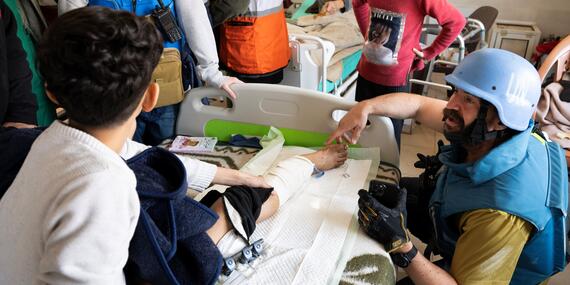Today's top news: Occupied Palestinian Territory, Ukraine, Haiti

Occupied Palestinian Territory
The Under-Secretary-General for Humanitarian Affairs, Martin Griffiths, said the decision to block food convoys of the UN Relief and Works Agency for Palestine Refugees in the Near East (UNRWA) to the north must be revoked, warning that it will only push thousands of people closer to famine.
In a social media post, Mr. Griffiths said he had urged Israel to lift all impediments on aid to Gaza, and this marks a further impediment.
UNRWA, he said, is the beating heart of the humanitarian response in Gaza.
Last week, only nine out of 17 humanitarian aid missions to northern Gaza were facilitated by the Israeli authorities.
Despite the challenges, we continue to deliver life-saving assistance wherever and whenever possible in Gaza.
On Saturday, the World Health Organization (WHO) led a mission with non-governmental organization partners to Kamal Adwan and Al Awda hospitals in northern Gaza to deliver 15,000 litres of fuel, as well as food and critical supplies. The team also provided technical support to establish a stabilization centre for children suffering from acute malnutrition with medical complications. And on Friday, WHO installed tents and nearly two dozen beds at Al-Aqsa hospital, in Deir al Balah, to expand capacity at the facility.
Meanwhile, intense Israeli bombardment and ground operations – as well as heavy fighting between Israeli forces and Palestinian armed groups – continue to be reported across much of the Gaza Strip, particularly near Al Shifa Hospital in Gaza city, as well as central Khan Younis, and in the vicinity of Al Amal and Nasser hospitals.
In Gaza city, the Israeli military operation in and around Al-Shifa Hospital has continued for the eighth consecutive day.
WHO’s Director-General, Dr. Tedros Adhanom Ghebreyesus, described conditions at the hospital as “utterly inhumane.”
In a social media post on Friday, he said a doctor at Al Shifa reported that some 50 health workers and more than 140 patients had been kept in one building since the second day of the raid, with extremely limited food and water, and only one non-functional toilet. There were no medicines or basic medical supplies, and patients were reportedly in critical condition, with two having died due to a lack of electricity.
Dr. Tedros called for an immediate end to the siege and appealed for safe access to ensure that patients get the care they need.
Meanwhile, OCHA and WHO are extremely worried about patients and their companions, as well as the few health workers remaining at Al Amal Hospital in Khan Younis. Most patients and people sheltering there have been forced to leave, as hostilities around the hospital intensify.
WHO said that their team was not given clearance to reach the hospital on Sunday evening to carry out an assessment and facilitate the transfer of patients. However, they provided water and first aid to several health workers who left the hospital.
We reiterate once again that safe access is urgently required so that patients can receive life-saving care. It is incumbent on parties to the conflict to respect their obligations under international law to protect civilians – including patients and health workers.
Ukraine
New strikes across the country over the weekend left hundreds of thousand people in Kharkiv, Odesa, and Kryvyi Rih without electricity and heating.
In Kyiv this morning, which was also hit by strikes, authorities reported that several civilians were injured. Schools and homes were damaged in three districts, according to the city authorities and partners.
Also this morning, more civilians were injured and civilian infrastructure impacted in the Mykolaiv Region, in the south of Ukraine, according to local authorities. Humanitarian organizations rapidly mobilized to provide people with psychosocial and legal support and emergency repair materials.
Following a blackout in Kharkiv, our humanitarian partners, together with local organizations, provided hot meals to 10,000 people, including in hospitals, shelters and other places.
Haiti
Violence and insecurity in Port-au-Prince continues to disrupt aid operations.
WHO warns that less than half of health facilities in the capital are functioning at their normal capacity as the crisis has crippled operations and hindered access to the few remaining facilities.
As an example of the volatile environment and its impact on the health sector, the Bernard Mevs hospital in Port-au-Prince, which had recently reopened, was forced to suspend again its operations due to insecurity.
Despite the challenges, WHO is supporting the Ministry of Health and local partners with supplies and logistics, including water, sanitation and hygiene and disease surveillance in centres for displaced people.
For its part, the World Food Programme said that yesterday they were able to provide 17,500 hot meals to displaced.
UNICEF and its partners continue to provide psychosocial support to people impacted by the recent events.
The humanitarian community continues to strongly appeal to all parties to urgently allow unhindered, safe access to people in need.
